Risk
The CALP Network’s State of the World’s Cash report found that the perception that CVA is riskier than other forms of aid was one of the main barriers to CVA being routinely used. This concern is linked to the growing emphasis from donors on anti-terrorism and money laundering, and shrinking budgets for humanitarian assistance. The CALP Network’s work under this theme aims to debunk myths, facilitate collaboration, and share learning to ensure that CVA is systematically and equally considered, based on evidence of actual risks across modalities.
Current priorities
A variety of organisations are currently working on CVA and risk. The CALP Network is working to identify synergies among actors, avoid duplication, and define joint priorities that can be better addressed collectively. Together with WFP, the CALP Network is co-leading the risk priority within the Grand Bargain workstream on cash.
Featured content

Podcast: Will risk aversion hold us back from realizing the potential of CVA?
Podcast
Episode 1 of the CashCast, exploring how attitudes to risk have impacted the use of CVA in the Middle East and North Africa region.

CVA and Risks: What happens in the field, stays in the field?
Blog Post
In October 2019 in Douala, Cameroon, the CALP Network facilitated a learning event exploring the risks to beneficiary protection in Cash and Voucher Assistance (CVA). This closed-door workshop, held as part of series of meetings and webinars on theme of CVA and risk in different regions, convened 25 humanitarian workers from West and Central Africa representing local and international NGOs, UN...

Webinar: Data sharing in CVA: ethics, ownership and privacy
Event
Thematic lead
Latest

Lessons Learnt and Recommendations for Cash-for-Shelter Programmes in the Democratic Republic of Congo
Report
This document provides an overview of how cash and voucher assistance is being used by shelter partners in DRC and details the lessons learnt to-date. It goes on to put forward recommendations and opportunities to strengthen cash and market-based programming in the shelter/housing sector there. An...
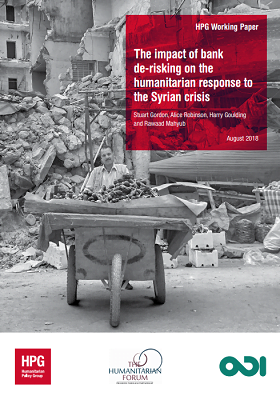
The impact of bank de-risking on the humanitarian response to the Syrian crisis
Report
The Syrian crisis is a complex environment for aid agencies wishing to move funds for humanitarian purposes into the country, or through neighbouring states supporting regional humanitarian efforts. The combination of counter-terrorist financing (CTF) legislation and international sanctions have made it...

Mainstreaming Gender-Based Violence Considerations in Cash-Based Interventions: A Case Study from Lower Juba, Somalia
Report
This case study provides an overview of assessment and monitoring activities
conducted by the Women’s Refugee Commission and Adeso to mainstream GBV considerations within Adeso’s CBI in Lower Juba.

Mainstreaming Gender-Based Violence Considerations in Cash-Based Interventions: A Case Study from Zinder, Niger
Report
This case study provides an overview of assessment and monitoring activities undertaken by the Women’s Refugee Commission and Save the Children to mainstream gender-based violence (GBV) considerations in Save the Children’s cash-based intervention (CBIs) in Zinder. Key findings, learning and...
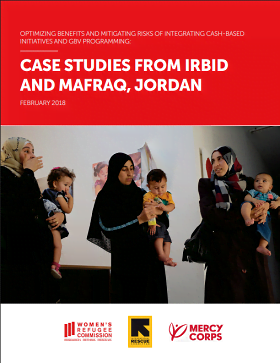
Optimizing Benefits and Mitigating Risks of Integrating Cash-Based Initiatives and GBV Programming: Case Studies from Irbid and Mafraq, Jordan
Report
This case study provides an overview of assessment and monitoring activities
conducted by Mercy Corps and the International Rescue Committee in partnership with the Women’s Commission to:
a. mainstream gender-based violence (GBV) considerations in cash-based interventions
b. utilize cash within a GBV...
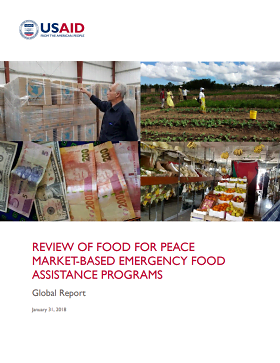
Review of Food for Peace Market-Based Emergency Food Assistance Programs Global Report
Report
Efficient and effective use of humanitarian funds is critical to meet the emergency needs of as many people as possible, especially as emergencies in developing countries have become more numerous, complex, and protracted. The United States Agency for International Development (USAID) Office of Food for...

Review of Food for Peace Market-Based Emergency Food Assistance Programs: Democratic Republic of Congo Case Study Report
Report
The Democratic Republic of Congo (DRC) case illustrates the complexity and diversity of contexts within which program design and implementation occurs. It highlights the need for provincial-scale assessments, local market monitoring, and flexibility to pivot to different modalities depending on changing...

A Meeting of Cash Working Group Leads: Sharing Experiences and Learning from Burundi, Ethiopia, Kenya, Madagascar, Tanzania, Somalia, South Sudan, Sudan and Tanzania
Report
Cash Working Group (CWG) leads from nine countries came together to share experiences and learn from one another. This report brings together observations and reflections from the meeting. It provides insights that are likely to be of interest to anyone involved in CWGs or discussions about the...
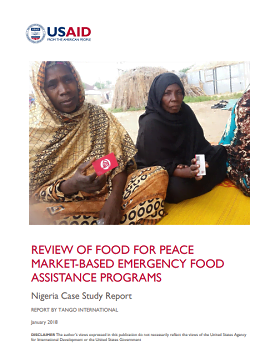
Review of Food for Peace Market-Based Emergency Food Assistance Programs: Nigeria Case Study Report
Case Study
Nigeria is an example of food assistance in a conflict situation in the Sahelian context. The response used information technology to deliver one of the more sophisticated applications of voucher programs. This case is a good example of proactive implementing partner (IP) mechanisms and monitoring systems...
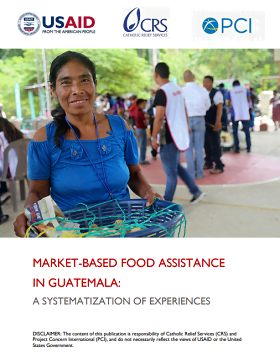
Market-based Food Assistance in Guatemala: A Systematization of Experiences
Guidelines and Tools
In April 2017, at the request of the United States Agency for International Development’s (USAID) Office of Food for Peace (FFP) in Guatemala, Catholic Relief Services (CRS) and Project Concern International (PCI) designed a process to gather and synthesize the experiences of food assistance...
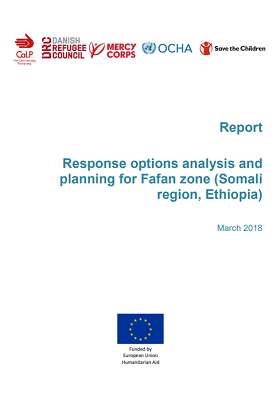
Response options analysis and planning for Fafan zone (Somali region, Ethiopia)
Guidelines and Tools
Between October 2017 and March 2018, the Consortium began the pilot in Ethiopia with the aim of providing technical and strategic support to country-based humanitarian organisations, enabling them to engage in collaborative assessments and decision making. Whilst the Consortium has not been conceived to...
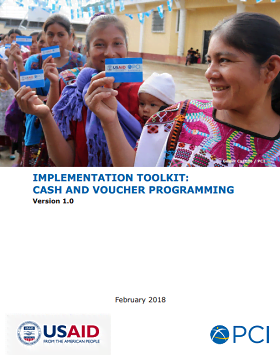
Implementation Toolkit: Cash and Voucher Programming
Guidelines and Tools
This set of tools developed by PCI seeks to harmonize language and approaches for use by teams involved in the design and implementation of cash transfer programs and is not intended to be a complete guide for design and implementation. The tool box focuses on the crucial steps within the program cycle of...
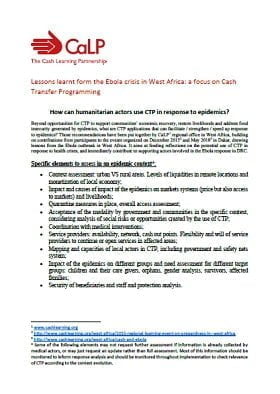
Lessons Learnt from the Ebola Crisis in West Africa: a focus on Cash Transfer Programming
Report
Beyond opportunities for CTP to support communities’ economic recovery, restore livelihoods and address food insecurity generated by epidemics, what are CTP applications that can facilitate / strengthen / speed up response to epidemics? Those recommendations have been put together by the CALP Network...
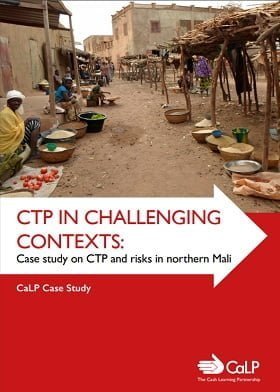
CTP in Challenging Contexts: Case study on CTP and risks in northern Mali
Report
This case study was commissioned by the the CALP Network as the first output under the 2018–2019 workstream on cash transfer programming (CTP) and associated risks. The study aims to contribute to the body of evidence on CTP-related risks and mitigation strategies by drawing lessons learnt and...

Learning Review: Blockchain Open Loop Cash Transfer Pilot Project
Report
A pilot study of the use of blockchain open loop in cash transfers. The study explores how mobile money through MPESA can be linked to blockchain embracing innovation and improve accountability in Kenya.
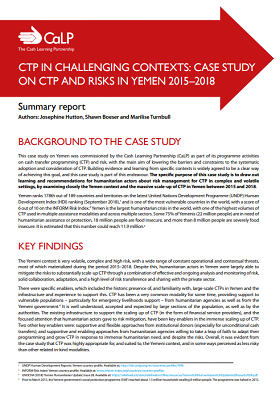
CTP in Challenging Contexts: Case Study on CTP and Risks in Yemen 2015–2018 – Summary
Report
Yemen is one of the most vulnerable countries in the world, and has long suffered from poverty, instability and vulnerability. The conflict, which has unravelled since late 2014, and, more specifically, since March 2015, has left 22 million Yemenis in need of some kind of humanitarian assistance or...

CTP in Challenging Contexts: Case Study on CTP and Risks in Yemen 2015–2018
Report
Yemen is one of the most vulnerable countries in the world, and has long suffered from poverty, instability and vulnerability. The conflict, which has unravelled since late 2014, and, more specifically, since March 2015, has left 22 million Yemenis in need of some kind of humanitarian assistance or...
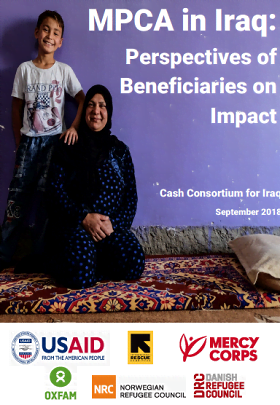
MPCA in Iraq: Perspectives of beneficiaries on impact
Report
Cash Transfer Programmes (CTP) have become a common feature of humanitarian responses in conflict and disaster settings, supported by a wealth of evidence that cash transfers are an effective means of meeting humanitarian needs, providing local markets are functioning and accessible. CTP without...

Global Framework for Action
Guidelines and Tools
This framework provides a consolidated summary of the major commitments and recommendations made to improve cash transfer programming in humanitarian response during 2015 and 2016. It aggregates the core content of: the Grand Bargain, ECHO’s 10 Principles, the High Level Panel report, the Strategic Note...

How We Built a Global Action Agenda to Enable Digital Payments in Humanitarian Response
Blog Post
In recent years, digital payments have emerged as an essential, high-impact tool for humanitarian response. They can enable humanitarian responders to quickly reach people with assistance, and in ways that provide both short- and long-term benefits to those in need, such as access to safe and portable...



